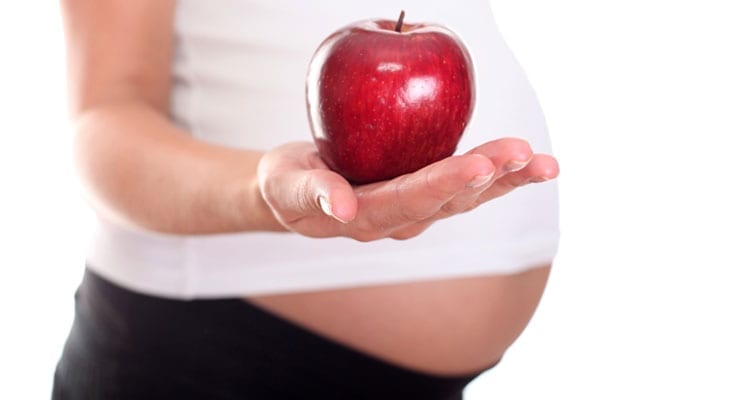There is a common misconception while pregnant, that eating for two means you need to consume more food. While pregnant you only need 250 -300 more calories then you do before you were pregnant. Chances are if you are eating a typical American diet you are getting way over the daily calories needed even without a baby growing inside. Instead of worrying about eating enough food, focus more on its value. Everything you put in your mouth goes right into your baby’s development, forming the structure from which they will grow. The healthier you eat the better you will feel and the stronger your body will be to support your pregnancy. You can shift your awareness simply asking yourself these two questions: How is this food feeding me? How is this fueling my baby’s development?
EAT ORGANIC
Organic foods are certified to be free of any chemical treatments. Pregnant woman and children are the most vulnerable to these toxins – its been proven that pesticides cross the placenta. Growth hormones are found in cattle, poultry and eggs that are not raised on organic farms. Growth hormones have been linked to certain cancers; can alter hormone production that can lead to early puberty in girls and cause development and reproductive problems. Organic foods might coast a little more; but is there really a price you can put on you and your families health?
EAT FOR FUEL
Whole foods (non processed, fresh, high quality, nutrient rich foods) are filled with lots of healing properties. When we become aware and see how it really feeds us, our relationship with food and eating will change. Lets take beets for instance, Beets – tone the blood and build red blood cells, they are high in calcium, iron, magnesium, potassium and zinc (just to name a few). Beets are great for anemia, during menstruation or to nourish the blood after birth.
INCREASE YOUR INTAKE OF…
When pregnant or trying to conceive you need to increase your intake of these supplements. You can also get them from eating whole foods that contain these properties:
CALCIUM
Calcium development of strong bones and teeth. It also can help you with leg cramping and insomnia. Calcium can be found in: dairy products, non fat and whole milk, cottage cheese, yogurt, cheese, sesame seeds, soy beans, tofu, tempeh, tahini, black strap molasses, almonds, almond butter, orange juice, calcium- fortified rice, soy or almond milk, calcium fortified tomato juice, dried figs, broccoli, dark leafy greens- such as – kale, bok choy, turnip greens, collard greens, mustard greens, sardines, salmon, parsley, sea weed and beans.
FOLIC ACID
In the beginning of pregnancy its important you make sure you get enough folic acid to reduce your chances of having a child with spinal bifida and other abnormalities of the spine and brain. Folic acid can be found in foods such as: Brewers yeast, wheat germ, fortified cereals, whole grains, bananas, blackberries, strawberries, yogurt, asparagus, green beans, peas, avocados, broccoli, cauliflower, Brussels sprouts, raw spinach, dark leafy greens, mushrooms, orange juice, sunflower seeds, egg yolks, lentils, beans, split peas, barley, brown rice, liver and baked goods made with enriched flour.
ESSENTIAL FATTY ACIDS / OMEGA 3
These oils are vital for the normal development of the retina, fetal nervous and immune systems and are essential for normal development of the fetal brain (70% of all EFA’S go to the brain), They also help reduce your chances of developing preclampsia, reduce postpartum depression and minimize the chance of preterm labor. Foods that contain omega’s are: Fish oil, olive oil, canola oil, hempseed oil, hemp seeds, flax seed oil, flax seeds, sesame seeds, pumpkin seeds, walnuts, sun flower seeds, buckwheat, almonds and nut butters, lentils, split peas, soy beans, soy products, wheat germ, salmon, cod, avocados, kale, spinach, collard greens and winter squash.
IRON
Iron is essential for hemoglobin (the protein in red blood that transports oxygen to other cells). An iron deficiency is called anemia, which is very common in pregnancy. Foods high in iron are: Liver, meat, poultry, dark meat turkey, fish, cook in cast – iron cook ware, brewers yeast, black strap molasses, soy, navy, lima, kidney, black and pinto beans, lentils, chic peas, sea vegetables, winter squash, dried apricots, prunes, prune juice, raisins, pumpkin seeds, oatmeal, millet, and whole wheat bead.
PROTEIN
Protein is the basic building blocks for all of our baby’s tissues and cells. The growth of the placenta and uterus, the extra blood supply, the making of breast milk, and the structure of the baby’s brain is largely dependent on the proteins we consume. Protein is found in – meats, poultry, fish, eggs, milk, soybeans, soy products, yogurt, spruilina, cottage cheese, cheese, kidney beans, beans , lentils, nuts and seeds.
SOMETHING TO PONDER FOR THE WEEK
Ask yourself : How is this fueling me? How is this feeding my developing baby? Is this the best choice : if no, then what can I eat that would benefit us both?
About The Author
Intuitive Healer, inspirational Life-Coach, Doula, & Transformational Body-Worker. Lori Bregman has over twenty years of experience assisting clients transform their lives and getting them onto their own healthy and unique paths.





